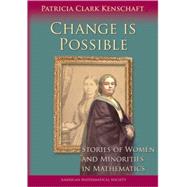Change Is Possible: Stories of Women And Minorities in Mathematics
, by Kenschaft, Patricia Clark- ISBN: 9780821837481 | 0821837486
- Cover: Paperback
- Copyright: 8/1/2005
Based on dozens of interviews and extensive historical research, and spiced with interesting photographs, this entertaining book relates stories about mathematicians who have defied stereotypes. There are five chapters about women that provide insight into the nineteenth and the mid-twentieth century, the early 1970s, the early 1990s, and 2004. Activists in many fields will take heart at the progress made during that time. The author documents the rudimentary struggles to become professionals, being married without entirely giving up a career, organizing to eliminate flagrant discrimination, improving the daily treatment of women in the professional community, and the widespread efforts toward true equality. The stories of African Americans in mathematics include the efforts of Benjamin Banneker, an eighteenth century American who had three grandparents born in Africa. He helped design Washington, DC, and made the computations for almanacs that succeeded Benjamin Franklin's. There are stories about African American mathematicians who were students and faculty in late nineteenth century colleges and accounts of several efforts to integrate the mathematical community in the mid-twentieth century. These stories indicate that though some efforts were more successful than others, all of them were difficult. The book concludes with a happier chapter about five black mathematicians in the early twenty-first century. The book also includes five interviews with leading Latin American mathematicians, along with the results of a survey of Latino research mathematicians in the Southwest. The author is a skilled story-teller with good stories to tell. This book is a page-turner that all mathematicians--as well as others concerned with equality--should read. It is a work of great interest and an enjoyable read.







